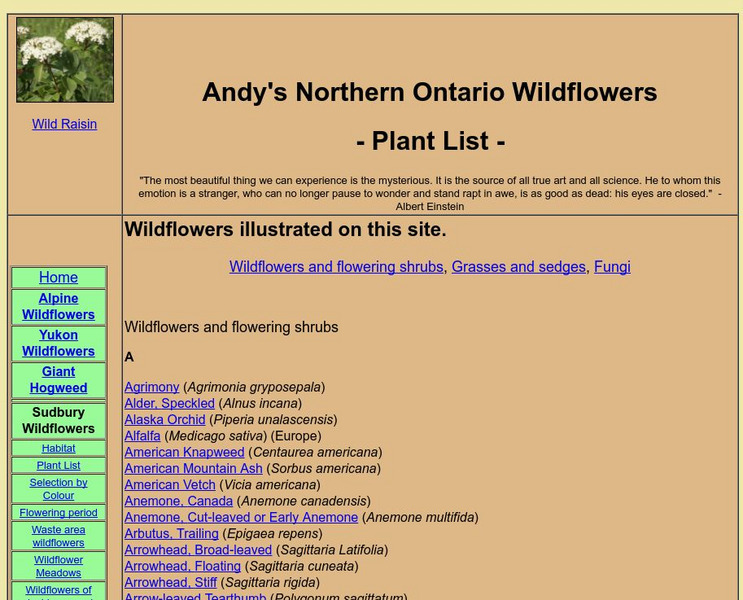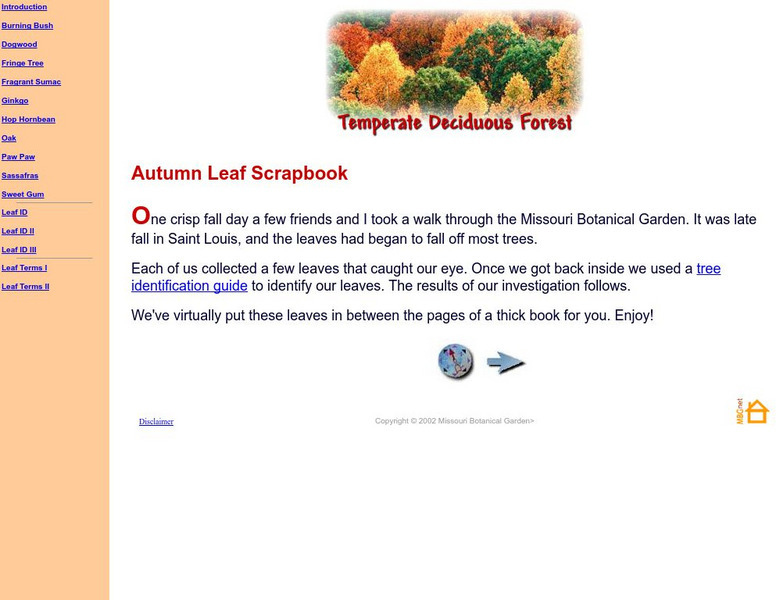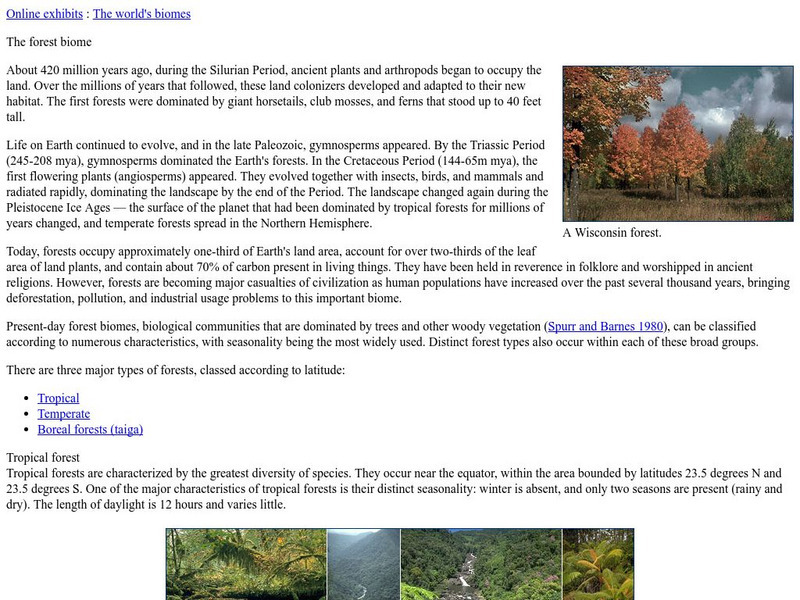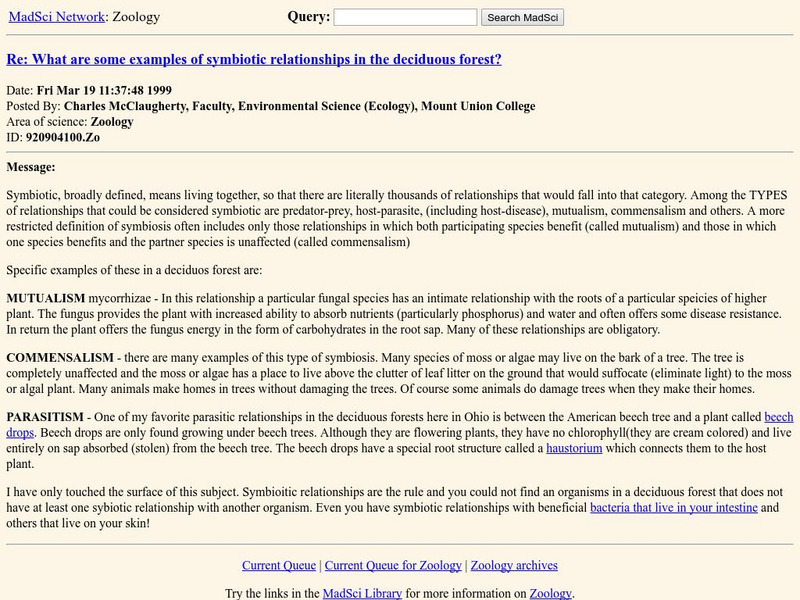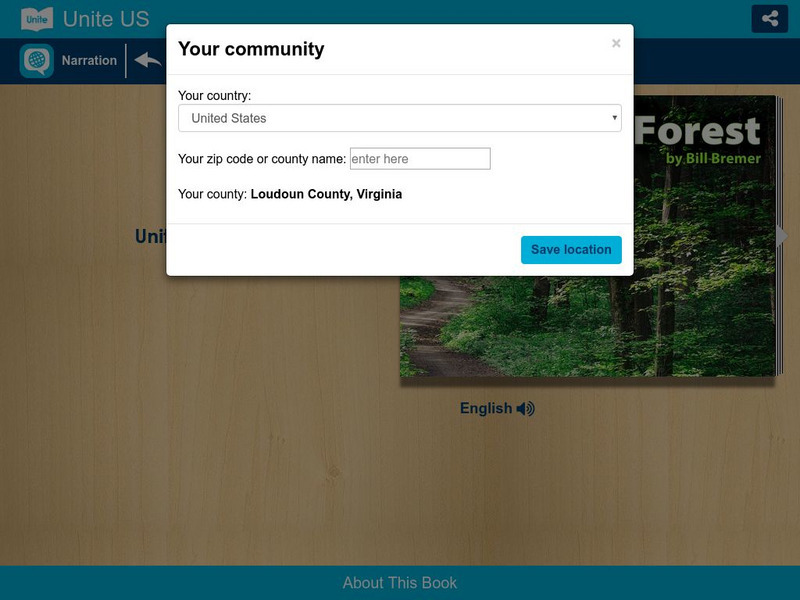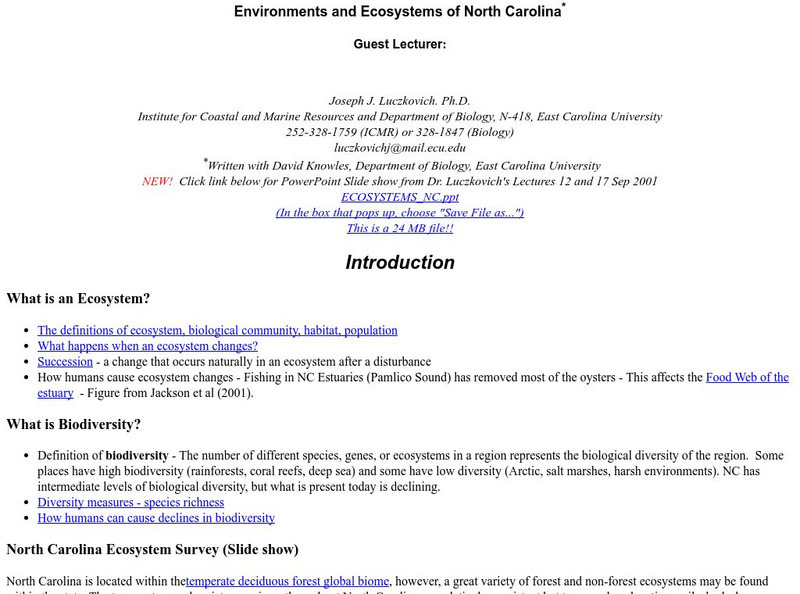Tramline
Virtual Field Trip: Temperate Forest Biome
Travel with your students on a Virtual Field Trip to learn about Temperate Forest Biomes. You will also discover many informative and interactive websites.
Other
Montreal Botanical Garden: Trees Inside Out
A comprehensive resource on trees, covering many topics, including growth, needs, diversity, and identification. There is a section profiling botanists who work at this arboretum, and another where the public can present questions to the...
Other
Andy's Northern Ontario Wildflowers
Listed on this page are some northern Ontario wildflowers that occur in the northern deciduous forest in Canada. Provided are descriptions and information about the plants, and numerous pictures.
World Wildlife Fund for Nature
Wwf: Our Earth: Ecoregions: Habitats: Temperate Forests
Defines "temperate forest" and introduces three types: Mediterranean forests, temperate rainforests, and deciduous forests.
US Department of Agriculture
The Science of Color in Autumn Leaves
Coupled with a beautiful photo gallery, the National Arboretum sets out to explain the science behind why leaves of deciduous trees change their color in the autumn months. While temperature effects the colors, learn here what happens in...
Friends of Algonquin Park
The Science Behind Algonquin's Animals: Deciduous Forest
Learn about this hardwood forest, its wildlife, and plant species. View a panorama movie of a typical Hardwood Forest in the summer.
Missouri Botanical Garden
Missouri Botanical Garden: Autumn Leaf Scrapbook
Learn how to examine a deciduous tree and how to identify the various leaves by their shape and color. There is a guide to leaf terminology with helpful accompanying diagrams.
Environmental Education for Kids
Eek!: Why Do Leaves Change Color?
Simple, but thorough explanation of fall colors in deciduous forests. Where the color comes from and how trees lose their leaves.
University of California
Ucmp: Haracteristics
Brief, but thorough overview of the temperate deciduous forest. Lists of flora and fauna found in the forest.
ClassFlow
Class Flow: Georgia Habitats
[Free Registration/Login Required] This flipchart provides an overview of the habitats of Georgia - salt marsh, ocean, and deciduous forest.
Mocomi & Anibrain Digital Technologies
Mocomi: Major Biomes of the World
Covers the major types of biomes: tropical rain forest, arctic tundra, coniferous forest, deciduous forest, desert, grasslands, and mountains.
MadSci Network
Symbiotic Relationships in the Deciduous Forest
A brief definition of symbiotic, followed by explanations of mutualism, commensalism, and parasitism.
University of California
Ucmp: The World's Biomes
This is an introduction to the major biomes on Earth. This page groups biomes into five major types: aquatic, deserts, forests, grasslands, and tundra. Information on climate, animal/plant life, and much more is given for each of type...
Other
Introduction to the Biosphere: Characteristics of the Earth's Terrestrial Biomes
From Chapter 9 of a textbook on physical geography that covers the biosphere. Important vocabulary is highlighted and linked to a glossary. It explains the characteristics of a biome, and describes the features of the eight different...
Other
Plant Watch
The Plant Watch website is designed to teach students how to record observations about plants. The site provides good information about the parts of plants and the section, "Plant Descriptions," will lead you to detailed information on...
Utah Education Network
Uen: Science Vocabulary Game
Fourth graders will play a review memory game with Utah's Grade 4 Science Standard V vocabulary words during this activity. Words associated with living things and classifications of living things are included in this activity.
Enchanted Learning
Enchanted Learning: Biomes
Discover the hidden treasures in the different habitats on the earth! The earth is filled with many biomes. Examples of different biomes are listed and include hyperlinks to additional information such as the animals found there.
Unite for Literacy
Unite for Literacy: Earth and Sky: The Forest
Take a walk in the forest and enjoy the trees and animals that live there. Book includes audio narration in 7 additional languages with text in English.
University of California
Ucmp: Forest Biome
Learn all about the forest biome including where located in the world, different kinds, climate, flora and fauna, and soil. Good research site for middle years students.
Globio
Glossopedia: Temperate Forest
Temperate forests cover much of the Earth. Temperate forest ecology is described as well as the importance to all animal and plant health. Human impact on temperate forests around the world is discussed.
PBS
Nh Pbs: Nature Works: Red Squirrel
The common red squirrel is found throughout most of North America in coniferous, deciduous and mixed coniferous-deciduous forests. This site features information ranging from characteristics, life cycle, diet, behavior, range and habitat.
Climate Literacy
Clean: It's Time to Tell the Story About Buds, Leaves and Global Warming
In this activity, students explore how, in New England, the timing of color change and leaf drop of deciduous trees is changing.
Other
Environments and Ecosystems of North Carolina
North Carolina is located within the temperate deciduous forest global biome, however, a great variety of forest and non-forest ecosystems may be found within the state. The temperature and moisture regimes throughout North Carolina are...
Vocabulary University
My vocabulary.com: Word Roots Lesson 4: Grad Mot Cad: Word Roots #4 Advanced
This lesson plan features the Latin roots GRAD = step, walk, degree; MOT = move; CAS/CID = fall, sink. Choose 1 of the 8 different word puzzle activities from the list below. Each word puzzle will have directions, a clue and a vocabulary...
Other popular searches
- Deciduous Forest Food Chains
- Deciduous Forests Map
- Deciduous Trees
- Evergreen Trees Deciduous
- Deciduous Forest Biome
- Deciduous Forests
- Deciduous Forest Ecosystem
- Deciduous Forest Food Web
- Coniferous Deciduous Trees
- Deciduous & Evergreen Trees
- Deciduous and Coniferous
- Temperate Deciduous Forest




